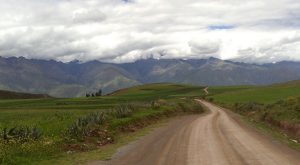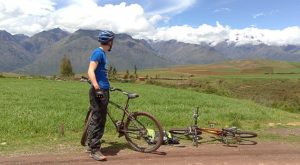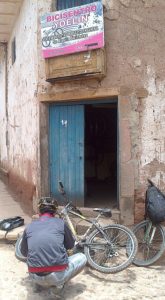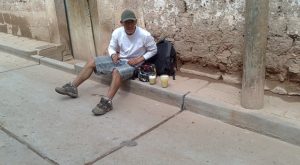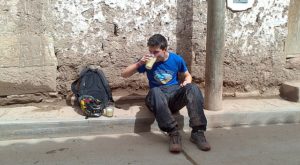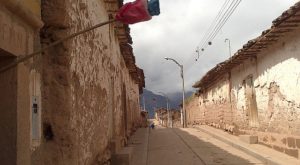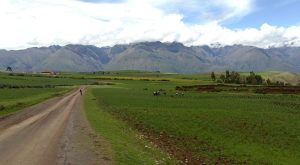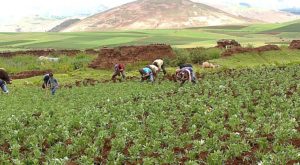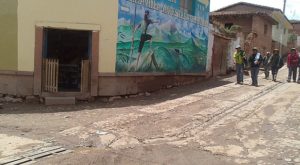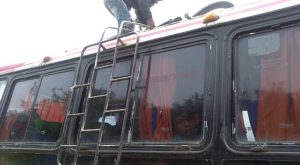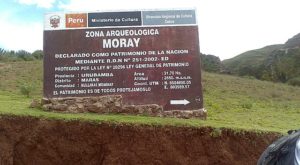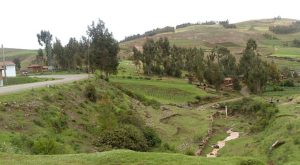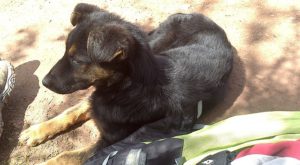Gasping for air like an asthmatic in a smokers’ room (after only about 30 seconds of ‘climbing’ a gently-sloped hill), I was beginning to wonder whether bike riding was such a good idea.
The altitude on the route between Maras and Moray (two ancient towns in the hills mountains near the Sacred Valley (see 9.4)) meant even minimal excursion lead to lead legs.
A few bananas and a some water later, I decided this was all a bit ridiculous and forced myself to get moving.
The views around the area were majestic, and a teaser before the Inca Trail. What I found as enjoyable though was the interactions with local people. But we’ll get to that soon.
The day began putting on waterproofs. As it’s the season, most mornings have begun this way.
I met up with Eduardo, who would be my guide for the day, in Cusco’s central square, and we then biked down to the bus station. He thought there were meant to be others coming, but for whatever reason it was just the two of us.
The bus felt sort of similar to those in Punta Gorda, Belize (see 6.3.1/ 6.3.2) in that it was rickety and heading out into the rural heartland. The mountain bikes were strapped to the roof, Eduardo grabbed us a packed lunch and we clambered on as it was departing.
Many towns later, we alighted, straightened out the bikes and begun our way towards the archaeological site of Moray.
Pretty soon after passing about the third flock of sheep being shepherded along the dirt track/ road we were now on, Eduardo’s chain snapped. Even the novice cyclists among you can appreciate how this makes riding a bike problematic.
When we passed a couple on the side of the road, Eduardo enquired where the nearest place he could get it repaired was. The conversation was like talking to Dolly Parton: “Go find Jolene” “Jolene?” “Jolene..” “Joleeene”.
In Maras we found the shop belonging to “Yoelin” to be closed. A few enquiries later, we tracked her down and Eduardo began to fix the chain.
The whole episode felt very quaint. If you replaced bike chain with horseshoe, and Jolene/ Yoelin with village blacksmith, it could’ve been a Dickens novel.
With the bikes back in order we left the roads of Maras, and hit up the dirt tracks to Moray. This began with the very slight ascent from earlier, and my lungs entering phone-a-friend mode.
The weather meant we couldn’t venture too much off-road (the ride was already postponed a day), but this wasn’t an issue at all, as we stopped and chatted with a number of the locals along the way. Once I had caught my breath of course.
One such group was some farmers planting “aba”, one of the many types of corn in Peru. They were ploughing away in the same way as their Incan ancestors – i.e. no machinery. Another was some kids leading a donkey along the road, ladened with supplies from the town (Eduardo guessed near our bus stop).
Two and a half hours after taking the bikes off the bus route, we reached the Moray site and stopped for lunch. Here we chatted some more about languages (he’d forgotten the English for “mud”), our backgrounds and how we both had a black dog.
At that moment, a little friend joined us, clearly interested in the conversation (and perhaps our sandwiches)
On the route back we had a timely pit stop by our farmers again and rekindled earlier conversations. I tried my Quechua phrase from the other day (see 9.3.1) on Eduardo and he more or less understood. He tried to teach me some more expressions, however I almost instantly forget them. He said linguistically, Quechua is most similar to Japanese, which I guess helps explain why.
The ground that took an hour to ascend was covered in a little under ten minutes as we whizzed through the fields on the way back to Maras, adding a thick layer of mud to our clothing. The mountains served as a picturesque backdrop, though with speed and debris, it was often necessary to squint.
With all the talk of corn earlier on, Eduardo asked if I fancied grabbing a chicha? From 9.3.1, I knew he was talking about the beer, and took him up on the offer. The market for chicha is a particularly interesting one, and I hadn’t fully appreciated its complexities (or rather simplicities) from before.
Beer and economics again; I was very pleased.
To make chicha is a simple enough process from what I could gather. Corn is dried out in the sun, ground up, combined with water and left to ferment before being filtered. Fermentation is only for a day, hence why it is only ~2% ABV (sugars not converted to alcohol).
Many households make chicha and have a stock of it which they sell to others in the town/ passing cyclists. If a house can vend, they have a bamboo stick by the front door, to act as a signal to those who are thirsty. This is a universal sign across Peru.
The lady who served us was mid-way through washing clothes when we came a-knockin’. She popped inside, came out with a couple of big glasses, left us to it and returned to her scrubbing.
Eduardo said that the recipe is exactly the same at all the chicha houses, apart from a special harvest in November when a sweeter, red corn is used.
To me, the market appears to almost be at a state of ‘perfect competiton’. This was indicative in the price: less than 15p a pint. I’ll repeat: less than 15p a pint. Crazy, right?
Once I’d picked up the tab we were on our way back to the main road to catch the bus back to Cusco. The winding route took us back through the same towns, but we could see them this time as the rain/ condensation had subsided.
As I have often found the case, these journeys welcome you to all sorts of interesting characters.
There was a man asleep on a bag of potatoes. At the back: a teenage girl blasting out Lady Gaga from her phone. At the front: a four year old boy singing along. And an old woman cradling kitten.
Back in Cusco, we rode the bikes back to their owner, and walked back to the centre via a particularly pungent meat market.
Near the central square I said my Goodbyes to Eduardo and headed back to the hostel, with my eyes peeled for the nearest laundrette.
